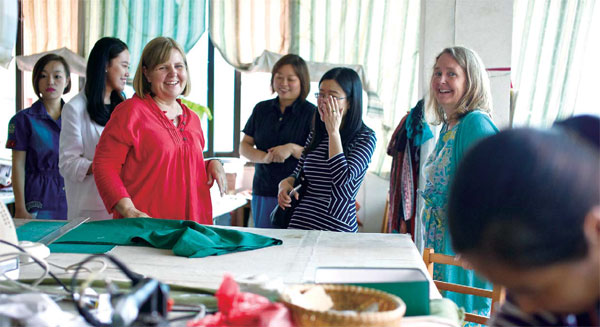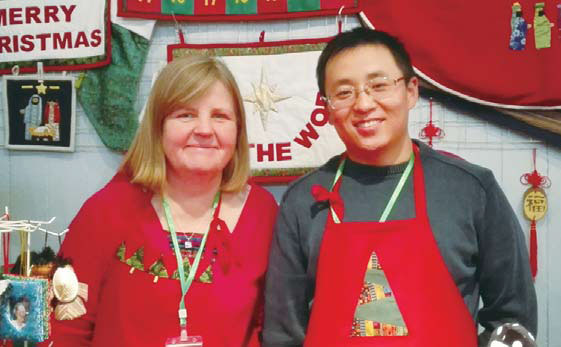A new life answering call to help

Woman from Northern Ireland finds a family, a career and a purpose after landing in Kunming for a five-week course in Chinese
Ingrid Chen, 52, greets local residents in fluent Mandarin in the morning as she rides a bicycle to work in an alley near Yuchi Road in Kunming, the capital of Yunnan province.
Chen, who stands out thanks to her blond hair and height, had no intention when she first came to China to settle in this southern city, which sits at an altitude of 1,900 meters, giving it a pleasant, spring-like climate. But aside from the charms of Kunming and its people, she established a family in the city and also started a business to help local disabled people.
| Ingrid Chen (in red) with Tina Redshaw (far right), the British consul-general in Chongqing, at the factory of Hearts & Hands in Kunming last year. Photos Provided to China Daily |
| Ingrid Chen and her husband Gang Chen. |
Chen, then Ingrid Simms, left her hometown of Belfast, Northern Ireland, in 1992 at age 28 to study Chinese at Yunnan Minzu University for five weeks. She became fascinated by Yunnan's wide range of ethnic and linguistic minorities. She returned to Kunming in 1993 and studied for three years at the university.
After graduation, she taught English at an international school for a year, then began working for Fu Hua Guoji (Bless China International), a nongovernmental organization with the mission of helping the poor and disabled in China that is registered in both China and the United States.
Chen had experience teaching the deaf in Northern Ireland, so she learned Chinese Sign Language in Kunming. "I hoped to help them, and by learning Chinese Sign Language I was able to offer more help," she tells China Daily.
Chen worked in a program that teaches sign language, crafts and sewing skills to people over 16 with no educational opportunities from rural areas around Kunming.
"Usually the deaf students studied in the training class for three months," she says. "We could not help them to thoroughly remove communication obstacles with three months of training, but we did help them communicate with sign language, as well as regain confidence by making new friends."
In 2002, Chen and some partners from the NGO established their own company, Hearts & Hands, to sell products created in the traditional style of Yunnan ethnic cultures. They include handmade bags, toys and decorative items made by the deaf and are sold overseas.
There are 72 million deaf people in China, and many of them struggle to find an education and a job, according to the company website, heartsandhandschina.com.
The idea for the company came in 2000, first as a training class in patchwork and quilting for young deaf students, then as a small handcraft business employing young deaf people, according to the website, which displays products made by the workers - who number more than 40 - and tells some of their stories.
"We have been surprised that the products made by these disabled people have been welcomed so warmly by customers," Chen says. "We just wanted to start a business to help provide job opportunities for them."
The company is on the fourth and fifth floors of an old building that also houses the NGO. It is less than 100 meters from Yunnan Huaxia Specialized Secondary School, the only secondary school in southwestern China that offers classes for disabled students.
Some students work at the company as interns. While there currently is no formal connection between the school and company, they hope to build ties that could make it easier for students to find jobs there. Some of the company's workers also have gone on to other jobs.
Chen says she picks the traditional styles of Yunnan's 25 officially recognized ethnic groups that she thinks will sell well, in some cases combining them with Western designs. "I myself am a laowai (foreigner), so maybe I'm able to understand what kinds of minority products are more welcome in foreign markets," she says.
Still, Chen says the company has had its share of difficulties, especially because when they first started they had little experience in marketing and company management. At times, being a foreigner has made navigating local regulations tougher, though her husband, Gang Chen, who is from Lanzhou, in Northwest China's Gansu province, gives her a hand. They met at the NGO and married in 2003.
The website says that while customers can't buy directly online, they should email the company about making a purchase.
A currency devaluation in one of their most important markets, Australia, also has hurt. They also sell to Britain and the United States.
"The company had a deficit of $20,000 in 2015 due to currency devaluation," on annual sales of $70,000, she says.
Gang Chen devotes time to the company, but along with five deaf workers he also makes closets and bookshelves for the Chinese market.
The couple have never taken salaries for their work, Ingrid Chen says, adding that she has never regretted starting the company.
"The daily expenses of the family are mostly from my husband's (woodworking) pay and help from my relatives from the UK," she says. "All my family members and friends have given me great support, both emotionally and financially, for what I have done here in China."
Her contributions in helping disabled people in China garnered Ingrid Chen the Caiyun Award, given to foreigners who make significant contributions to Yunnan by the provincial government.
Wang Sumei, a manager who has worked at Hearts & Hands for eight years, calls Ingrid Chen a kind person who cares a lot about deaf people.
"In the aspect of work, she is a brilliant leader with a full sense of responsibility," Wang says.
Ingrid Chen says Kunming is now home. The couple have two children, a 12-year-old son and a 10-year-old daughter.
"The kids are enjoying living here," she says. "We go back to Britain occasionally, and the kids think the UK is fun as well. Although they were not born in Kunming, they did grow up here, and they treat Kunming as their home.
"I don't think we will leave China and go back to the UK, at least not in the foreseeable future, given that my husband works in China and my kids go to school here. Kunming is good. I feel free to live my life here."
Shi Wenzhi contributed to this story.
Contact the writers through renqi@chinadaily.com.cn
(China Daily European Weekly 04/22/2016 page21)
Today's Top News
- Takaichi must stop rubbing salt in wounds, retract Taiwan remarks
- Millions vie for civil service jobs
- Chinese landmark trade corridor handles over 5m TEUs
- China holds first national civil service exam since raising eligibility age cap
- Xi's article on CPC self-reform to be published
- Xi stresses improving long-term mechanisms for cyberspace governance
































